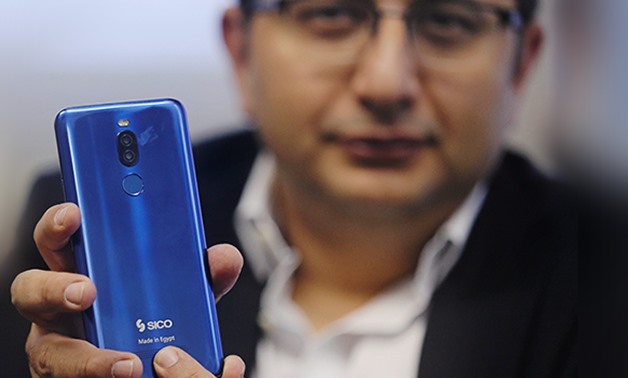
Mohamed Salem, CEO of SICO Egypt, holds a SICO mobile phone during an interview with Reuters in Cairo, Egypt June 30, 2018. Picture taken June 30, 2018. REUTERS/Mohamed Abd El Ghany
CAIRO –2 July 2018: Egypt’s first smartphone maker is looking to capture 17 percent of the country’s market by 2020, up from 2.7 percent, its chairman said, as the company aims to tap a sprawling low-income market that has long been priced out of using high-tech phones.
Mohamed Salem told Reuters in an interview that Silicon Industries Corporation (SICO), was targeting low-income clients in the country, selling about 120,000 handsets since the phone went on sale in February and hopes to double its market by 2020.
“Our target is for exports to reach 60 percent of our production by 2020,” Salem told Reuters, adding the phone was already on sale in the United Arab Emirates (UAE) and will be in Kuwait later this week and in Saudi Arabia by the end of July.
“We will expand in Arab markets and in Africa during the coming period,” he added.
Private investors hold 80 percent of the company, which was set up in September with capital of 150 million pounds ($8.4 million), while the remaining 20 percent is held by the Ministry of Communication.
SICO hopes to be listed on the Cairo stock exchange within three years, Salem said.
He said the company, which has pumped some 440 million pounds into developing six types of smartphones, under the brand name Nile X, and a tablet computer, plans to increase its investments to one billion pounds by 2020.
The company expects losses in 2018, Salem said without giving figures, but added he hoped to move into profit in 2019 as the company, which also produces computer tablets, tries to increase its market share to around 10 percent.
Salem said about 80 percent of its sales will target low-income clients with handset prices under $100, while 20 percent will be aimed at better-off customers.
The company was also capitalizing on Egyptian nationalist sentiments to attract a wider market, he said.
The company uses a Chinese design of 3G/4G U.S. technology, Salem said, adding that local input was expected to rise to 65 percent within one year from 45 percent now.
Imported components include batteries, LCD display and a touch panel.
“Our current market share is 2.7 percent and we hope to reach 6 percent by the end of the year and 10 percent in 2019 and around 17 percent by 2020,” Salem said
He said the company was targeting 1.2 billion pounds in sales this year, more than doubling to 2.5 billion in 2020.


Comments
Leave a Comment